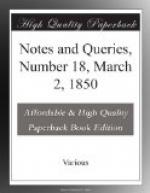“’Out of the ivory palaces whereby they have made thee glad,’—rather, from ’cabinets of Armenian ivory they have pleasured thee.’ From cabinets or wardrobes, in which the perfumes, or the garments were kept.”
This meaning of the word, derived from the Hebrew, corroborates the sense given to it in Mr. Halliwell’s Dictionary of Archaic, &c. Words, viz, a storehouse.
Alfred Gatty.
Ecclesfield, Feb. 9.
AElian.—The querist (No. 15. p. 232.) is informed that AElian’s Treatise De Animalium Natura has been translated into Latin as well as his other works, by Conrad Gessner, fol. Zurich, 1556; but, it does not appear that an English translation of it has hitherto been published.
A.W.
Brighton.
Why Dr. Dee quitted Manchester.—A correspondent (No. 14. p. 216.) of yours wishes to know the reason why Dr. Dee resigned his wardenship and left Manchester. I would refer him to the interesting “Life of Dee,” by Dr. Cooke Taylor, in his Romantic Biography of the Age of Elizabeth, who writes:
“But in his days mathematics were identified with magic, and Dee’s learned labours only served to strengthen the imputations cast upon his character by the Fellows of his College in Manchester. He was so annoyed by these reports that he presented a petition to King James, requesting to have his conduct judicially investigated; but the monarch, on the mere report that Dee was a conjuror, refused to show him the slightest favor. Indignant at the injurious treatment he continued to receive, he quitted Manchester with his family in the month of November, 1604: it is uncertain whether he renounced his wardenship at the same time, but he seems to have received no more of its revenues; for, during the remainder of his life, {285} which was passed at Mortlake, he suffered severely from the pressure of poverty.”
He died in 1608. Dr. Taylor, I suppose, writes on the authority of Dee’s MSS. and Journal, edited by Dr. Isaac Casaubon.
W.M.K.
Viridis Vallis (no. 14. p. 213.).—This is the monastery of Groenendael, situated in the forest of Soignies, near Brussels. In the Bibliotheque des Ducs de Bourgoyne are preserved several manuscript volumes relative to its history. (See Marchal’s Catalogue, vol. ii. p. 84.) Sir Thomas Phillipps has also a Chartulary of this monastery among his manuscripts.
F.M.
Recent Novel.—I beg to inform “Adolphus” that the Novel of which he is in search (No. 15. p. 231.) is Le Morne au Diable, by Eugene Sue; the hero of which is the Duke of Monmouth, who is supposed to have escaped to Martinique.
J.S.
* * * * *
MISCELLANIES.
Use of Monosyllables.—In Beaumont and Fletcher’s Boadicea, Act 3. Sc. 1. (Edinbugh, 1812), I meet with the following lines in Caratach’s Apostrophe to “Divine Andate,” and which seem to corroborate Mr. C. FORBES’S theory (No. 16. p. 228.) on the employment of monosyllables by Shakspeare, when he wished to express violent and overwhelming emotion: at least they appear to be used much in the same way by the celebrated dramatists whom I quote:




